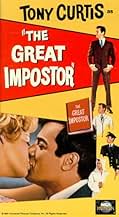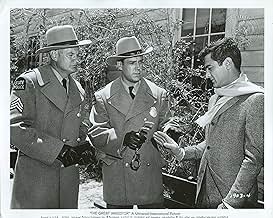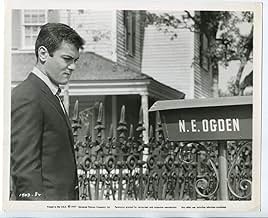CALIFICACIÓN DE IMDb
6.9/10
1.8 k
TU CALIFICACIÓN
Agrega una trama en tu idiomaFerdinand Waldo Demara Jr. is a versatile man who gets his kicks out of impersonating a marine, a monk, a navy surgeon and a prison warden, eventually getting in trouble with the law for it.Ferdinand Waldo Demara Jr. is a versatile man who gets his kicks out of impersonating a marine, a monk, a navy surgeon and a prison warden, eventually getting in trouble with the law for it.Ferdinand Waldo Demara Jr. is a versatile man who gets his kicks out of impersonating a marine, a monk, a navy surgeon and a prison warden, eventually getting in trouble with the law for it.
- Dirección
- Guionistas
- Elenco
- Premios
- 2 nominaciones en total
Dick Sargent
- Hotchkiss
- (as Richard Sargent)
Robert Crawford Jr.
- Fred Demara Jr.
- (as Robert Crawford)
- Dirección
- Guionistas
- Todo el elenco y el equipo
- Producción, taquilla y más en IMDbPro
Opiniones destacadas
That this movie, made in 1961, wasn't the inspiration for Frank Abagnale (Catch me if you can), the bit Spielberg/DeCaprio/Hanks hit currently in theaters. When I saw the promos for CMIYC I thought, "Hey! This is a remake of an old Tony Curtis film!"
The IMDB search shows that The Great Impostor was made in 1961; Frank Abagnales adventures as an imposter started in '62 or '63. Wonder if he saw the film?
I can't remember if I loved The Great Impostor or not but I'm guessing I did; the plot is sooooooooo similar to Catch Me If You Can and I liked that film quite a lot!
The IMDB search shows that The Great Impostor was made in 1961; Frank Abagnales adventures as an imposter started in '62 or '63. Wonder if he saw the film?
I can't remember if I loved The Great Impostor or not but I'm guessing I did; the plot is sooooooooo similar to Catch Me If You Can and I liked that film quite a lot!
This very interesting film was based upon a book of the same name, in turn, based upon the extremely unorthodox life of Ferdinand Demara.
Watching this film naturally leads us to the question of what motivated Demana to lead this semi-criminal life? Is he a compulsive snake?: one who must periodically shed his skin because he needs new types of challenges periodically to avoid boredom? Or is he playing a cat and mouse game, periodically testing whether he can, once again, beat the system in assuming the identity of someone else? I suspect some of both. Unlike as shown in the film, he actually joined a monastery for several years when he ran away from home at age 16. I would think it extremely unusual for a restless teen to do so. I think that should tell us something about his psychological state.
There is always the problem of a few people who meet the bureaucratic requirements for a profession or advanced schooling but lack real life competency vs. those who are or show promise of being quite competent but lack the bureaucratic criteria for being accepted as an advanced student or as a professional.
The film dramatizes only a few of Demara's impersonations, albeit some of the most astounding. His attempt to reform the typical brutality in prisons was one highlight. However, his masquerading as a doctor in the Canadian Navy during the Korean war is the most unbelievable segment. Included is his historical surgery on several wounded Koreans while aboard ship.
I wonder if he had gotten married if he would have settled down? The fact that he tried to make it as a monk in his early adulthood may suggest that he didn't have marriage in his plans. Incidentally, Sue Anne Langdon sure was cute and vivacious as an aggressive man eater!
Demana is shown faking a suicide. This really happened.
I'm very surprised that this film was shot in B&W at this late date(1961), although Universal was a notoriously cheap studio.
Watching this film naturally leads us to the question of what motivated Demana to lead this semi-criminal life? Is he a compulsive snake?: one who must periodically shed his skin because he needs new types of challenges periodically to avoid boredom? Or is he playing a cat and mouse game, periodically testing whether he can, once again, beat the system in assuming the identity of someone else? I suspect some of both. Unlike as shown in the film, he actually joined a monastery for several years when he ran away from home at age 16. I would think it extremely unusual for a restless teen to do so. I think that should tell us something about his psychological state.
There is always the problem of a few people who meet the bureaucratic requirements for a profession or advanced schooling but lack real life competency vs. those who are or show promise of being quite competent but lack the bureaucratic criteria for being accepted as an advanced student or as a professional.
The film dramatizes only a few of Demara's impersonations, albeit some of the most astounding. His attempt to reform the typical brutality in prisons was one highlight. However, his masquerading as a doctor in the Canadian Navy during the Korean war is the most unbelievable segment. Included is his historical surgery on several wounded Koreans while aboard ship.
I wonder if he had gotten married if he would have settled down? The fact that he tried to make it as a monk in his early adulthood may suggest that he didn't have marriage in his plans. Incidentally, Sue Anne Langdon sure was cute and vivacious as an aggressive man eater!
Demana is shown faking a suicide. This really happened.
I'm very surprised that this film was shot in B&W at this late date(1961), although Universal was a notoriously cheap studio.
My favorite Tony Curtis picture has always been The Great Imposter. He's supported in this true story of a man who wouldn't settle for the humdrum by a wonderful cast of Hollywood players.
This film is particularly personal to me because I knew a Ferdinand Waldo DeMara character in my life. This person was not a great impostor like Curtis plays in this film, but like DeMara was amazingly bright and was a quick study. Even though he didn't have a high school diploma just like Fred DeMara, like DeMara with study he could learn enough to do anything. Unfortunately in the span of his life on earth all he did was use his brain was to con the social service system. And like Karl Malden's priest confidante to Tony Curtis, I told him he could do so much more with his life. Tony Curtis's performance is spot-on for me.
I have to say that my favorite moment in the movie is when DeMara is finally unmasked and we see a series of reaction shots of the various people he's fooled. Most of the facial expressions are of shock, but Raymond Massey who plays the Abbott of a Trappist Monastery reads the newspaper and has a grin that is priceless.
Recently Leonardo DiCaprio did a similar film and Catch Me If You Can did not take as lighthearted an approach as The Great Imposter. But the two should be viewed side by side for comparison. Leo's Frank Abegnale is also spot-on, but I think I like Tony Curtis's performance a tad better.
Maybe because this film is so personal others might not see it as I do, but I give it the best rating around.
This film is particularly personal to me because I knew a Ferdinand Waldo DeMara character in my life. This person was not a great impostor like Curtis plays in this film, but like DeMara was amazingly bright and was a quick study. Even though he didn't have a high school diploma just like Fred DeMara, like DeMara with study he could learn enough to do anything. Unfortunately in the span of his life on earth all he did was use his brain was to con the social service system. And like Karl Malden's priest confidante to Tony Curtis, I told him he could do so much more with his life. Tony Curtis's performance is spot-on for me.
I have to say that my favorite moment in the movie is when DeMara is finally unmasked and we see a series of reaction shots of the various people he's fooled. Most of the facial expressions are of shock, but Raymond Massey who plays the Abbott of a Trappist Monastery reads the newspaper and has a grin that is priceless.
Recently Leonardo DiCaprio did a similar film and Catch Me If You Can did not take as lighthearted an approach as The Great Imposter. But the two should be viewed side by side for comparison. Leo's Frank Abegnale is also spot-on, but I think I like Tony Curtis's performance a tad better.
Maybe because this film is so personal others might not see it as I do, but I give it the best rating around.
"The Great Impostor" is quintessential Tony Curtis. Curtis was never an exceptional screen actor but a decent one, probably more for his good looks and charisma than his ability to become different people. He is in the category of what I call "charisma actors". (I would include Tom Cruise and Brad Pitt in the same category.) Charisma actors are talented and can be very convincing given the right role. And this was the right role for Curtis.
"The Great Imposter" tells the true story of Ferdinand Waldo Demara (Curtis) who was chronicled in a novelistic book of the same name written by Robert Crighton (who also wrote "The Secret of Santa Vittoria"). Demara assumed different identities, such as a monk, a sheriff's deputy, and notably, a prison warden, usually without the expected credentials. Probably the exploit he is most known for which brought him both recognition but exposed his chicanery was becoming a ship's surgeon for the Canadian military during the civil war in Korea. And he didn't have a medical degree!
Curtis was perfect casting as Demara. He makes his character fun and likeable. The real Demara was somewhat heavy-set, unlike Curtis. However, Curtis captures the essence of Demara's likability which was probably the reason for his success. The real Demara found ways of inserting himself to situations without alienating or threatening those already there. While the movie exaggerates a little bit the outcomes of some of Demara's ventures, it's a fun and thoroughly entertaining film. Not one which will go down in the annals of the greatest movies ever made, but it holds its own. A must for Curtis fans.
"The Great Imposter" tells the true story of Ferdinand Waldo Demara (Curtis) who was chronicled in a novelistic book of the same name written by Robert Crighton (who also wrote "The Secret of Santa Vittoria"). Demara assumed different identities, such as a monk, a sheriff's deputy, and notably, a prison warden, usually without the expected credentials. Probably the exploit he is most known for which brought him both recognition but exposed his chicanery was becoming a ship's surgeon for the Canadian military during the civil war in Korea. And he didn't have a medical degree!
Curtis was perfect casting as Demara. He makes his character fun and likeable. The real Demara was somewhat heavy-set, unlike Curtis. However, Curtis captures the essence of Demara's likability which was probably the reason for his success. The real Demara found ways of inserting himself to situations without alienating or threatening those already there. While the movie exaggerates a little bit the outcomes of some of Demara's ventures, it's a fun and thoroughly entertaining film. Not one which will go down in the annals of the greatest movies ever made, but it holds its own. A must for Curtis fans.
Tony Curtis portrays "Ferdinand Waldo Demara Jr.," who faked being a doctor, warden, monk and teacher. When I saw this at the theater 45 years ago, I thought it was fascinating. Much older and seeing it on tape about 10 years ago, it wasn't as interesting as I had remembered. I guess when you're a kid, everything on the big screen is impressive.
Humor helped in this film, giving it some life here and there as it's a bit slow-moving but still entertaining. I've usually found Curtis entertaining to watch, a man who played a lot of interesting characters. I still think he is/was an underrated actor, too.
It was nice seeing the main character, although being a fake, still asking for God's help in certain situations, inside knowing he was not doing the right thing. Those parts would be edited out if the film was re-made today. I agree, too, with a fellow reviewer that faking being a surgeon is not something to be laughed at, especially if he was doing his operating on you or me!
Humor helped in this film, giving it some life here and there as it's a bit slow-moving but still entertaining. I've usually found Curtis entertaining to watch, a man who played a lot of interesting characters. I still think he is/was an underrated actor, too.
It was nice seeing the main character, although being a fake, still asking for God's help in certain situations, inside knowing he was not doing the right thing. Those parts would be edited out if the film was re-made today. I agree, too, with a fellow reviewer that faking being a surgeon is not something to be laughed at, especially if he was doing his operating on you or me!
¿Sabías que…?
- TriviaTony Curtis as Demara is shown boarding HMCS Cayuga (a Tribal Class destroyer), which was the actual ship the real Demara sailed in.
- ErroresDemara is assigned to HMCS Cayuga on 16 June 1951. However, in the Captain's cabin, there is a picture on the wall of Queen Elizabeth II, who ascended the throne on 6 February 1952 on the death of her father, King George VI. Also, the portrait appears to be the 1956 Pietro Annigoni painting of the queen.
- Citas
Ferdinand Waldo Demara Jr.: Help me dear God, I don't want to kill anybody.
- ConexionesFeatured in The UnXplained: Leading Double Lives (2020)
Selecciones populares
Inicia sesión para calificar y agrega a la lista de videos para obtener recomendaciones personalizadas
- How long is The Great Impostor?Con tecnología de Alexa
Detalles
- Fecha de lanzamiento
- País de origen
- Idiomas
- También se conoce como
- The Great Impostor
- Locaciones de filmación
- Los Ángeles, California, Estados Unidos(Griffith Park)
- Productora
- Ver más créditos de la compañía en IMDbPro
- Tiempo de ejecución
- 1h 53min(113 min)
- Color
- Relación de aspecto
- 1.85 : 1
Contribuir a esta página
Sugiere una edición o agrega el contenido que falta




























